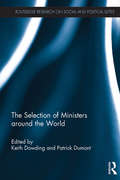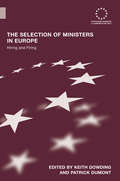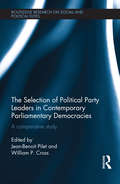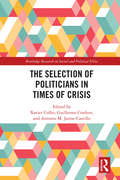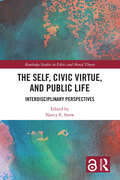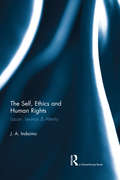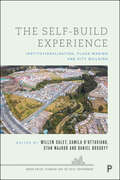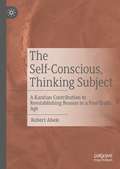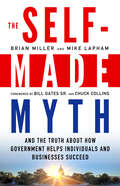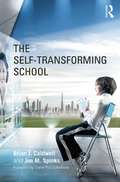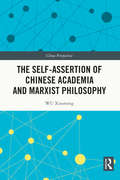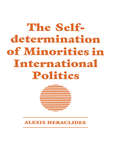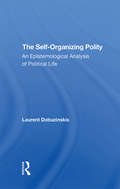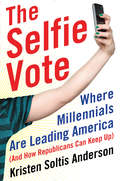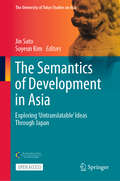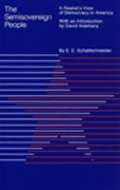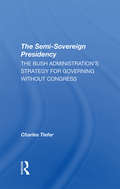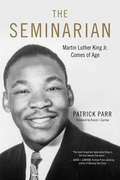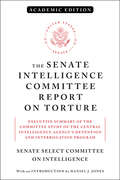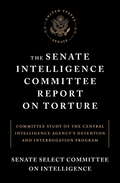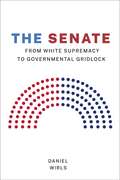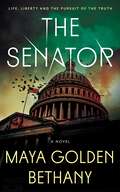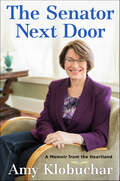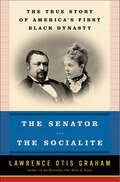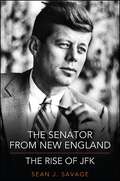- Table View
- List View
The Selection of Ministers around the World: A Comparative Study (Routledge Research on Social and Political Elites)
by Keith Dowding Patrick DumontGoverning cabinets are composed of ministers who come and go even as governments march on. They work for the chief executive, the prime minister or the president, for their parties and for the constituent groups from which they come. They are chosen for their role and dismissed from it for all sorts of reasons that vary across time and country. This book examines the process of selection, shuffling and removal of ministers in national cabinets around the world. Drawing on original data over several decades, it offers a series of case studies of countries from around the world with differing institutional and cultural structures including presidential and semi-presidential systems, and parliamentary, unitary and federal systems, some of which have experienced periods under authoritarian regimes. Featuring 14 case studies on North and South America, Asia, Africa, Australia and New Zealand, this book complements the earlier volume The Selection of Ministers in Europe (Routledge, 2009). This volume will be an important reference for students and scholars of political science, government, executives, comparative politics and political parties.
The Selection of Ministers in Europe: Hiring and Firing (Routledge Advances in European Politics)
by Keith Dowding Patrick DumontThis volume discusses the formation of government cabinets within twenty European democracies, providing the institutional background to the selection and de-selection of ministers. Exploring the historical and constitutional context to cabinet formation, this volume proceeds to provide vital data on the strategic issues that affect the selection of ministers. Covering states from all over Europe, the authors examine trends from the post-war period up to the present day, with specific focus on recent decades for the newer democracies in political transition. The volume includes: pioneering new research into the hiring and firing of government ministers vital information on appointments, dismissals and resignations within government cabinets succinct constitutional data relating to ministerial selections across a number of European states The book is the first output of the Selection and De-selection of Political Elites international network of scholars (SEDEPE) and will provide a major source of information for all scholars interested in the formation, maintenance and termination of cabinets and the nature of ministerial government. The Selection of Ministers in Europe. Hiring and Firing will also be of broader interest to students of European Government and Political Institutions.
The Selection of Political Party Leaders in Contemporary Parliamentary Democracies: A Comparative Study (Routledge Research on Social and Political Elites)
by William P. Cross Jean-Benoit PiletThis book explores the ways in which political parties, in contemporary parliamentary democracies, choose their leaders and then subsequently hold them accountable. The authors provide a comprehensive examination of party leadership selection and accountability both through examination of parties and countries in different institutional settings and through a holistic analysis of the role of party leaders and the methods through which they assume, and exit, the office. The collection includes essays on Australia, Austria, Belgium, Canada, Germany, Hungary, Israel, Italy, Portugal, Romania, Spain, Norway and the United Kingdom which have important differences in their party systems, their degree of democratization, the role assigned to party leaders and their methods of leadership selection. Each country examination provides significant data relating to party rules and norms of leadership selection, leadership tenures and leadership contests. The book concludes with a chapter that merges the country data analyses to provide a truly comparative examination of the theoretical questions underlying the volume. This book will be of strong interest to students and scholars of legislative studies, elections, democracy, political parties, party systems, political elites and comparative politics.
The Selection of Politicians in Times of Crisis (Routledge Research on Social and Political Elites)
by Xavier Coller Antonio M. Jaime-Castillo Guillermo CorderoSelecting candidates for elections is a major goal of political parties and a major function of political regimes in democratic systems. With the negative effects of the economic crisis being seen to translate into changes in voting patterns, and citizens using elections to punish parties in government for their roles in economic mismanagement or lack of response to the global economic crisis, a broad examination is required. This book is presented as the first comparative study of the effects of the political crisis on candidate selection covering a large number of countries. Using an integrated framework and unified strategy, it examines how new relevant political actors are really implementing participative ways of candidate selection, whether they are being innovative in their political environments and the extent to which traditionally mainstream parties are changing selection procedures to have more open and inclusive mechanisms as part of internal, or intra-party, democracy. The book illuminates these issues through empirically driven chapters explaining changes in the way candidates for parliaments are selected in countries where new parties have emerged and consolidated, or where traditional mainstream parties have adopted new mechanisms of selection affecting (if not challenging) traditional politics. Additionally, therefore, this work will serve as a response to some current debates in the discipline on the consequences of the democratization of party life, relating political participation and representation. This text will be of key interest to scholars and students of political parties, organizational change, social and political elites and more broadly to comparative politics and sociology.
The Self, Civic Virtue, and Public Life: Interdisciplinary Perspectives (Routledge Studies in Ethics and Moral Theory)
by Nancy E. SnowThis volume showcases new and interesting ways in which the possession of civic virtues can contribute to people’s abilities to engage in public life in meaningful ways.What is the role of civic virtues in public life? How does possessing civic virtues affect persons and their capacities for participation in the public order? The chapters in this volume combine philosophical and empirically informed work to show how civic virtues can be informed by larger virtue ethical perspectives. The first two chapters discuss virtues of individuals that have not received significant empirical attention—authenticity and wisdom and psychological resilience. The next two chapters address education and the ways in which civic virtues can help us to better serve schoolchildren who are socially and economically disadvantaged, as well as to broaden students’ horizons with respect to character and sustainability education. The final four chapters explore the roles for virtues within various political and public realms. They offer perspectives on how virtues affect contentious politics in democratic societies, and study virtues in contexts in which democracy has been stifled or torn apart by war. Together, the chapters highlight the ever-widening impact of the virtues on our lives and in society.The Self, Civic Virtue, and Public Life will be of interest to scholars and graduate students working in ethics, political philosophy, psychology, and philosophy of education.The Open Access version of this book, available at www.taylorfrancis.com, has been made available under a Creative Commons Attribution-Non Commercial-No Derivatives (CC-BY-NC-ND) 4.0 International license.
The Self, Ethics & Human Rights
by Joseph IndaimoThis book explores how the notion of human identity informs the ethical goal of justice in human rights. Within the modern discourse of human rights, the issue of identity has been largely neglected. However, within this discourse lies a conceptualisation of identity that was derived from a particular liberal philosophy about the ‘true nature’ of the isolated, self-determining and rational individual. Rights are thus conceived as something that are owned by each independent self, and that guarantee the exercise of its autonomy. Critically engaging this subject of rights, this book considers how recent shifts in the concept of identity and, more specifically, the critical humanist notion of ‘the other’, provides a basis for re-imagining the foundation of contemporary human rights. Drawing on the work of Jacques Lacan and Emmanuel Levinas, an inter-subjectivity between self and other ‘always already’ marks human identity with an ethical openness. And, this book argues, it is in the shift away from the human self as a ‘sovereign individual’ that human rights have come to reflect a self-identity that is grounded in the potential of an irreducible concern for the other.
The Self-Build Experience: Institutionalization, Place-Making and City Building (Urban Policy, Planning and the Built Environment)
by Willem Salet, Camila D’Ottaviano, Stan Majoor and Daniël BossuytUsing a broad international comparative perspective spanning multiple countries across South America, Europe and Africa, contributors explore resident-led self-building for low and middle income groups in urban areas. Although social, economic and urban prosperity differs across these contexts, there exists a recurring, cross-continental, tension between formal governance and self-regulation. Contributors examine the multi-faceted regulation dilemmas of self-building under the conditions of modernization and consider alternative methods of institutionalization, place-making and urban design, reconceptualizing the moral and managerial ownership of the city. Innovative in scope, this book provides an array of globalized solutions for navigating regulatory tensions in order to optimize sustainable development for the future
The Self-Conscious, Thinking Subject: A Kantian Contribution to Reestablishing Reason in a Post-Truth Age
by Robert AbeleThis book argues that the primary function of human thinking in language is to make judgments, which are logical-normative connections of concepts. Robert Abele points out that this presupposes cognitive conditions that cannot be accounted for by empirical-linguistic analyses of language content or social conditions alone. Judgments rather assume both reason and a unified subject, and this requires recognition of a Kantian-type of transcendental dimension to them. Judgments are related to perception in that both are syntheses, defined as the unity of representations according to a rule/form. Perceptual syntheses are simultaneously pre-linguistic and proto-rational, and the understanding (Kant’s Verstand) makes these syntheses conceptually and thus self-consciously explicit. Abele concludes with a transcendental critique of postmodernism and what its deflationary view of ontological categories—such as the unified and reasoning subject—has done to political thinking. He presents an alternative that calls for a return to normativity and a recognition of reason, objectivity, and the universality of principles.
The Self-Made Myth: And the Truth about How Government Helps Individuals and Businesses Succeed
by Mike Lapham Brian MillerThe Self-Made Myth exposes the false claim that business success is the result of heroic individual effort with little or no outside help. Brian Miller and Mike Lapham bust the myth and present profiles of business leaders who recognize the public investments and supports that made their success possible—including Warren Buffett, Ben Cohen of Ben and Jerry’s, New Belgium Brewing CEO Kim Jordan, and others. The book also thoroughly demolishes the claims of supposedly self-made individuals such as Donald Trump and Ross Perot. How we view the creation of wealth and individual success is critical because it shapes our choices on taxes, regulation, public investments in schools and infrastructure, CEO pay, and more. It takes a village to raise a business—it’s time to recognize that fact.
The Self-Transforming School
by Brian Caldwell Jim SpinksThe Self-Transforming School combines an insightful meta-analysis of factors contributing to the success of schools, and an examination of powerful mega-trends that are shaping developments in education, to offer the first mega-analysis in education policy and practice. The book spans fifty years, beginning with Caldwell and Spinks’ ground-breaking work The Self-Managing School which advocated innovative approaches that are now accepted as preferred practice, before offering a prognosis and plan for the future. The book argues that all schools in all settings can secure success for all students in an era where society and the economy are changing constantly and dramatically. Although schools find some support in local and global networks, externally designed re-structuring, re-staffing, or command-and-control direction isn’t sufficient to achieve transformation. Instead of replicating particular approaches to achieve modest improvement, leadership of the highest quality needs to be deeply embedded in schools and their systems. Caldwell and Spinks propose three important points that need to be taken into consideration:-schools are often at different stages of self-transformation -self-transformation requires a high level of professionalism, and must include teacher education and on-going professional development -funding is critically important, and efforts to build a capacity for self-transformation are constrained by what is available. The book gives particular attention to developments in Australia, Brazil, Canada, England, Finland, Hong Kong, India, New Zealand, Shanghai, Singapore and the United States. It will be of key interest to school leaders, policy makers, and academics and postgraduate students engaged in research on equity, student performance in highly disadvantaged settings and education policy.
The Self-assertion of Chinese Academia and Marxist Philosophy (China Perspectives)
by WU XiaomingFrom a Marxist philosophical perspective, this collection of essays investigates the maturing self-consciousness and self-assertion of Chinese academia, especially within the humanities and social sciences, permitting more penetrating insights and critical engagement with the social reality of China.The author elaborates on the relationship between Hegel and Marx’s philosophy and their concepts of reality, thereby accounting for the historic and philosophical conditions for the autonomy of Chinese academia. Drawing on intellectual resources from both Eastern and Western archives, including phenomenology, philosophical hermeneutics, Western Marxism, and China’s pacifist tradition, the book refutes Huntington’s speculation about Chinese imperialism and delineates how China’s development can contribute to a fundamental critique of capitalist civilisation and a new paradigm of global governance. In addition, the book challenges the thinking of Chinese neo-liberals and nationalist-conservatives and their understandings of the history and social reality of China. Hence, the author advocates a reconstruction of the spiritual and intellectual realm within society based on Marxism, in order to counter Sinophobia, neo-liberalism, and nationalism at the same time.The book will appeal to readers interested in social and political philosophy, philosophy of history, Marxism, and China studies.
The Self-determination of Minorities in International Politics
by Alexis HeraclidesPublished in 1991, The Self-determination of Minorities in International Politics is a valuable contribution to the field of Politics.
The Self-organizing Polity: An Epistemological Analysis Of Political Life
by Laurent DobuzinskisIs the study of living systems a useful metaphor for political science? In this book, Dr. Dobuzinskis argues for further exploration of biopolitical models to explain the complexity of political theory and social change. His discussion emphasizes the new cybernetics, which considers not only self-regulating but also self-organizing or self-producing systems. Self-organizing systems operate in an autonomous sphere comparable to the autonomy of the political community and the political actors who compose this community. The autonomy of these systems is maintained through dynamic equilibration processes that entail not only the preservation of a given structure but also, at crucial times, the creative rearrangement of the existing structure and its transformation into a new pattern of relations. From this perspective, a political crisis is both a threat to the political system and the occasion of its renewal; stability may also mean decay. Emphasizing the links that have developed historically between the natural and social sciences, this book is a reflection on the merits of and difficulties involved in representing the evolutionary process at the political level as the problematic reproduction of national communities and states.
The Selfie Vote: Where Millennials Are Leading America (And How Republicans Can Keep Up)
by Kristen Soltis AndersonThe GOP’s leading millennial pollster offers an eye-opening look at America’s shifting demographics and reveals how these changes will affect future elections.The American electorate is undergoing a radical transformation. Cultural factors are reshaping how a new generation of voters considers issues. Demographic shifts are creating an increasingly diverse electorate, and technological advances are opening new avenues for voter contact and persuasion.Kristen Soltis Anderson examines these hot-topic trends and how they are influencing the way youth, women, and minorities vote. Blending observations from focus groups, personal stories, and polling results, the Republican pollster offers key insights into the changing nature of American politics. The Selfie Vote introduces you to tech-savvy political consultants and shows you how these hip young pollsters and consultants are using data mining and social media to transform electoral politics—including tracking your purchasing history. Make some purchases at a high-end culinary store? Crave sushi? Your choices outside the ballot box can reveal how you might vote. And anyone interested in the future of politics should know where these cultural trends are heading.Data-driven yet highly readable, The Selfie Vote busts established myths about campaigns and elections while offering insights about what’s ahead—and what it could mean for American politics and governance.
The Semantics of Development in Asia: Exploring ‘Untranslatable’ Ideas Through Japan (The University of Tokyo Studies on Asia)
by Jin Sato Soyeun KimThis open access book explores Japanese involvement in Asian development through selected development ideas and lexemes that are widely regarded in Japan as 'untranslatable' into other languages. Each chapter traces the genealogy of locally nuanced development ideas and lexemes in Japan and the process by which they have spread across Asia and beyond through Japan's development cooperation. The Semantics of Development in Asia critically examines the diverse (Western and non-Western) roots of Japanese development ideas and lexemes and their shifting semantics, shaped by the ever-changing national/international political economies and dominant development thinking of different eras. The volume contributes to a more pluriversal approach to knowledge production in development studies through its in-depth examination of vernacular Japanese ideas. This book is useful to researchers, students and teachers in the fields of Asian studies, development studies andinternational relations. It is also of value to policymakers and practitioners whose professional interests include development cooperation by, and with, Asian countries.
The Semi-Sovereign People: A Realist's View of Democracy In America
by Elmer E. SchattschneiderThis book started out to be an attempt to formulate a theory of political organization. The assumption made throughout is that the nature of political organization depends on the conflicts exploited in the political system, which ultimately is what politics is about. The thesis is that we shall never understand politics unless we know what the struggle is about.
The Semi-sovereign Presidency: The Bush Administration's Strategy For Governing Without Congress
by Charles TieferIn The Semi-Sovereign Presidency, Capitol Hill insider Charles Tiefer shows how George Bush used the executive office to circumvent Congress, thwart official Washington, and confound the public will. Even Bush partisans may be surprised to discover the president's unprecedented use of executive signing statements to modify or, in effect, abrogate acts of Congress—even popular, bipartisan efforts like the 1991 Civil Rights Act; his commissioning of the "Quayle Council" to derail regulatory legislation such as the Clean Air Act of 1990; and his catapulting of the National Security Council into foreign policy prominence outstripping that of the Departments of Defense and State. As Tiefer details for the first time here, "Iraqgate," the hidden courtship of Saddam Hussein prior to the Gulf War, is perhaps the most dramatic example of Bush's executive fiat—a relationship conducted by way of Bush National Security Directives and similarly obscured from the public eye. Bush chose an essentially negative approach to governing partly because he was unwilling to engage Congress on matters of principle head to head and was equally unwilling to make his principles public—addressing himself to the nation as his predecessor had so effectively done. But, as Tiefer persuasively argues, it was Bush's belief in the sovereignty of executive power—an almost monarchical conception of the presidency—that was his primary modus operandi and ultimately his downfall. Bush and his approach to power are interesting not just to students and scholars of the presidency but to all citizens concerned about the country and its leadership.
The Seminarian: Martin Luther King Jr. Comes Of Age
by David Garrow Patrick ParrMartin Luther King Jr. was a cautious nineteen-year-old rookie preacher when he left Atlanta, Georgia, to attend divinity school up north. At Crozer Theological Seminary, King, or "ML" back then, immediately found himself surrounded by a white staff and white professors. Even his dorm room had once been used by wounded Confederate soldiers during the Civil War. In addition, his fellow seminarians were almost all older; some were soldiers who had fought in World War II, others pacifists who had chosen jail instead of enlisting. ML was facing challenges he'd barely dreamed of. A prankster and a late-night, chain-smoking pool player, ML soon fell in love with a white woman, all the while adjusting to life in an integrated student body and facing discrimination from locals in the surrounding town of Chester, Pennsylvania. In class, ML performed well, though he demonstrated a habit of plagiarizing that continued throughout his academic career. But he was helped by friendships with fellow seminarians and the mentorship of the Reverend J. Pius Barbour. In his three years at Crozer between 1948 and 1951, King delivered dozens of sermons around the Philadelphia area, had a gun pointed at him (twice), played on the basketball team, and eventually became student body president. These experiences shaped him into a man ready to take on even greater challenges. Based on dozens of revealing interviews with the men and women who knew him then,The Seminarian is the first definitive, full-length account of King's years as a divinity student at Crozer Theological Seminary. Long passed over by biographers and historians, this period in King's life is vital to understanding the historical figure he soon became.
The Senate Intelligence Committee Report on Torture (Academic Edition): Executive Summary of the Committee Study of the Central Intelligence Agency's Detention and Interrogation Program
by Senate Select Committee On IntelligenceThe study edition of book the Los Angeles Times called, "The most extensive review of U.S. intelligence-gathering tactics in generations."This is the complete Executive Summary of the Senate Intelligence Committee's investigation into the CIA's interrogation and detention programs -- a.k.a., The Torture Report.Based on over six million pages of secret CIA documents, the report details a covert program of secret prisons, prisoner deaths, interrogation practices, and cooperation with other foreign and domestic agencies, as well as the CIA's efforts to hide the details of the program from the White House, the Department of Justice, the Congress, and the American people. Over five years in the making, it is presented here exactly as redacted and released by the United States government on December 9, 2014, with an introduction by Daniel J. Jones, who led the Senate investigation. This special edition includes: • Large, easy-to-read format. • Almost 3,000 notes formatted as footnotes, exactly as they appeared in the original report. This allows readers to see obscured or clarifying details as they read the main text. • An introduction by Senate staffer Daniel J. Jones who led the investigation and wrote the report for the Senate Intelligence Committee, and a forward by the head of that committee, Senator Dianne Feinstein.
The Senate Intelligence Committee Report on Torture: Committee Study of the Central Intelligence Agency's Detention and Interrogation Program
by Senate Select Committee on Intelligence Diane Feinstein"The most extensive review of U.S. intelligence-gathering tactics in generations." --Los Angeles TimesIn the only fully searchable version available, this is the complete official summary report of the Senate Intelligence Committee's investigation of Central Intelligence Agency interrogation and detention programs launched in the wake of the 9/11 attacks. Based on over six million internal CIA documents, the report details secret prisons, prisoner deaths, interrogation practices, and cooperation with other foreign and domestic agencies. It also examines charges that the CIA deceived elected officials and governmental overseers about the extent and legality of its operations. Over five years in the making, and withheld from public view since its declassification in April, 2014, this is the full summary report as finally released by the United States government on December 9th, 2014.
The Senate: From White Supremacy to Governmental Gridlock (Constitutionalism and Democracy)
by Daniel WirlsIn this lively analysis, Daniel Wirls examines the Senate in relation to our other institutions of government and the constitutional system as a whole, exposing the role of the "world’s greatest deliberative body" in undermining effective government and maintaining white supremacy in America.As Wirls argues, from the founding era onward, the Senate constructed for itself an exceptional role in the American system of government that has no firm basis in the Constitution. This self-proclaimed exceptional status is part and parcel of the Senate’s problematic role in the governmental process over the past two centuries, a role shaped primarily by the combination of equal representation among states and the filibuster, which set up the Senate’s clash with modern democracy and effective government and has contributed to the contemporary underrepresentation of minority members. As he explains, the Senate’s architecture, self-conception, and resulting behavior distort rather than complement democratic governance and explain the current gridlock in Washington, D.C. If constitutional changes to our institutions are necessary for better governance, then how should the Senate be altered to be part of the solution rather than part of the problem? This book provides one answer.
The Senator
by Maya Golden BethanyFor fans of Louise Penny, a riveting political thriller set in today's Washington D.C., exploring the high stakes of power and corruption.US Senator Oliver Michaels of Maine campaigned on the hopes of changing Washington. One year after becoming the youngest senator in Congress, Oliver finds himself disheartened by systemic bureaucracy, partisan finger-pointing, the power of lobbyists, and the collapse of his marriage. When New York Times reporter Alex Broussard shows up at his office, Oliver is presented with a shocking corruption scheme involving two congressmen, the head of the Environmental Protection Agency, and a chemical manufacturer. With this real opportunity to clean up dirty DC politics, Alex reignites Oliver&’s pledge to help people lost in messy legislative battles and abandoned by government in sacrifice zones. Yet, lofty political aspirations aren&’t the only things burning with passion. Working side by side, Alex and Oliver, once an item in college, realize feelings still linger for one another. Alex and Oliver&’s efforts to expose the unlawful plot also uncovers the fact that they are pawns in a rigged game hosted by those who will do anything to keep their positions of power and their wallets padded - even kill. The stakes continuously rise, putting Alex, Oliver, and their family and friends in grave danger. Each must decide what&’s more important; the safety of their loved ones or the health of the public.
The Senator Next Door: A Memoir from the Heartland (Posthumanities Ser.)
by Amy KlobucharOne of the U.S. Senate's most candid--and funniest--women tells the story of her life and her unshakeable faith in our democracyMinnesota Senator Amy Klobuchar has tackled every obstacle she's encountered--her parents' divorce, her father's alcoholism and recovery, her political campaigns and Washington's gridlock--with honesty, humor and pluck. Now, in The Senator Next Door, she chronicles her remarkable heartland journey, from her immigrant grandparents to her middle-class suburban upbringing to her rise in American politics.After being kicked out of the hospital while her infant daughter was still in intensive care, Klobuchar became the lead advocate for one of the first laws in the country guaranteeing new moms and their babies a 48-hour hospital stay. Later she ran Minnesota's biggest prosecutor's office and in 2006 was the first woman elected to the U.S. Senate from her state. Along the way she fashioned her own political philosophy grounded in her belief that partisan flame-throwing takes no courage at all; what really matters is forging alliances with unlikely partners to solve the nation's problems.Optimistic, plainspoken and often very funny, The Senator Next Door is a story about how the girl next door decided to enter the fray and make a difference. At a moment when America's government often seems incapable of getting anything done, Amy Klobuchar proves that politics is still the art of the possible.
The Senator and the Socialite: The True Story of America's First Black Dynasty
by Lawrence Otis GrahamThe story of a slave-turned-US senator and an African American dynasty: “A compelling portrait of the Bruce family’s rise, dynamics and downfall.” —The Washington Post Spanning more than a century, Lawrence Otis’s illuminating biography is a fascinating look at race and class in the latter decades of nineteenth-century America, witnessed through the life of Blanche Kelso Bruce—United States senator from Mississippi and head of America’s first black dynasty. Otis reveals how Bruce rose from slavery to achieve power and prestige in the aftermath of the Civil War. With his wife, the daughter of a prominent Philadelphia physician, he would break social and racial barriers—a legacy continued by their children until scandal destroyed the family’s wealth and stature. Filled with triumph, tragedy, and the complexities and conflicts of the Reconstruction-era South, The Senator and the Socialite brings into focus an important yet little-known part of our nation’s past.“Graham, whose Our Kind of People profiled the black upper class, recovers the history of a family that broke barriers in Washington and at Exeter and Harvard. At the same time, he offers a devastating view of the compromises it made.” —The New Yorker“A poignant tale of struggle, accomplishment and weakness.” —The Washington Post “Not just a history but a revealing commentary on race and class, and on their inordinately powerful force in shaping our lives today.” —Chicago Tribune
The Senator from New England: The Rise of JFK (Excelsior Editions)
by Sean J. SavageGold Winner for Political Science, 2015 Foreword Reviews INDIEFAB Book of the Year AwardsJohn F. Kennedy's path to the presidency began during his eight years of service in the United States Senate. In The Senator from New England, Sean J. Savage contends that Kennedy initially pursued a centrist, bipartisan course in his rhetoric and policy behavior regarding the regional policy interests of New England. Following his narrow defeat for the Democratic vice presidential nomination in 1956 and his nationwide speaking campaign for Adlai Stevenson, JFK's rhetoric and policy behavior became more partisan and liberal, especially during the 1958 midterm elections. While JFK claimed that he still protected and promoted the policy interests of New England on a bipartisan basis, he used his speaking engagements to interact with Democratic politicians throughout New England in an effort to secure the entire region's delegate votes at the 1960 Democratic National Convention. Based on the use of primary sources, archives, and special collections from four presidential libraries, the Library of Congress, Boston College, the Margaret Chase Smith Library, the Massachusetts Historical Society, and other institutions, The Senator from New England provides an unrivaled glimpse into Kennedy's Senate career and early presidential campaign strategy.
